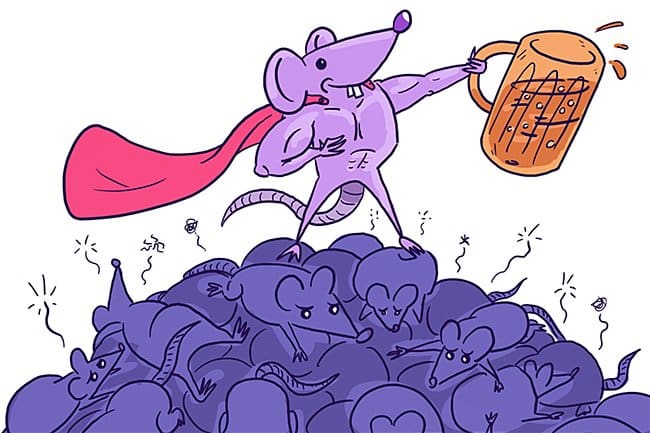This project is now in update mode. Check back regularly to see how things are progressing.
GIVING Tuesday!
The holiday spirit of December kicks off with GIVING Tuesday. Please consider donating to the important cause of elucidating the molecular basis for alcohol addiction and abuse. Once the major changes caused by alcohol in the brain are understood at this molecular level, we and other scientists can begin to intelligently design novel drugs to treat or cure alcohol abuse disorders.
Our fund raising campaign has generated more publicity. Monday we were spoofed at "ATX Uncensored". See on this weblink below. While this is admittedly funny, the cause and expected results of our Supermouse project are very serious. We will see who is laughing once the real supermouse is genetically engineered.
Also see the cute cartoon of Supermouse by Connor Murphy attached below. Thank you for your support!

Reached goal!
We are thrilled to announced that thanks to many small and mid-size donations as well as one exceptionally large donation, we have reached our goal of $12,000 to generate Supermouse!! We are using these funds immediately to generate this exciting mutant mouse that may unlock major mysteries in how alcohol impacts the nervous system for intoxication, withdrawal and addiction. Thanks to all of you!!
Having reached this celebratory milestone, we would like to aim even higher through the Thanksgiving holidays into December. We challenge supporters to please help us raise an additional $3,000 that we will use to fund research on how this molecular target of alcohol, the BK channel, works not just in the mouse brain, but also at the submicroscopic level. The BK channel is not a simple protein that binds alcohol like a key fitting into a lock. The channel moves dynamically in response to dozens of signals on the inside and outside of the cell. The amount of BK channel made when people are drinking alcohol versus abstaining appears to differ too. We aim to raise an additional $3,000 for funds to determine which of these molecular changes influence the function of the BK channel during important alcohol behaviors.
Please consider contributing to help us make this reach goal!! Many of us will be reflecting on alcohol abuse over the holidays where drinking can get out of hand. By simply donating and passing this important cause via email and social networks to your friends and family impacted by alcohol abuse, we can work together towards developing innovative treatments for alcohol addiction.
Fundraising milestone
Thanks to everyone for pushing our donations up past $1000!! This is a critical milestone to make major discoveries in alcohol research. Every little bit helps - either with a donation or by sharing on social media. Here, your friends and families who also are impacted by alcohol issues can contribute. As a community, we can make a huge difference.
I also wanted to share our research milestone. We just passed UT's ethics board to generate Supermouse. Our lab usually works on simple worms, which, of course, do not share the complex feelings of humans. Without these ethical issues, we usually have the luxury of thinking up an experiment in the morning and testing it before noon using worms. With ethical considerations of performing research on mice, however, UT and NIH place an ethics evaluation bar that we have to jump before we can perform our experiments. This is the case with our Supermouse. A committee of UT mouse experts triple check whether we have everything planned out to complete the planned experiment with consideration of the health and care of the mice. The entire detailed proposal is many pages and takes a few days to write. The committee also checks whether all of our lab members carry the proper certification to perform the experiments. I'm pleased to report that the committee has now checked us ready to start our experiments!
Now, we need YOUR help us raise the final funds for Supermouse. We will use this to purchase the parent mice, buy the reagents necessary to modify the DNA, inject into mouse eggs, transplant into new mice, to generate Supermouse!! With your help we can start this exciting experiment. Thanks again!
Supermouse covered on Fox news
Thanks to everyone who has donated so far!! We really need to spread the word via the internet to make it easy for people to donate. So please share via social media and emails to your friends who are impacted directly or indirectly by alcohol issues.
Interest in Supermouse research project has expanded to newspaper and now coverage on Fox news TV. See here for live interview from last night.
Supermouse nets news on The Daily Texan
Thanks to all of you who so far have donated funds towards generating Supermouse!! Any donation large or small helps. Please share our fundraising campaign via email and your social networks. Together we can raise this amount to make a huge difference in treatment of alcohol disorders.
Today we garnered attention on UT Austin's newspaper, The Daily Texan. Please find a link below to the article.
http://www.dailytexanonline.com/2015/10/28/research-team-seeks-funding-for-supermouse-project
Interview on Supermouse
Here are my answers to excellent questions posed by student journalist Catherine Marfin for her new article below.
What made you want to get involved in this research?
I lived with a family once where the father suffered from alcoholism. The wife and son were severely impacted by his disease. I saw no hope for them because there is no way to escape the clutches of alcohol addiction. I wanted to contribute to novel therapies for alcoholism.
Why the name Supermouse?
The worms that carry this mutation do not get drunk and suffer no ill effects during alcohol withdrawal. Isn’t that amazing? If we succeed in achieving these same amazing results in a mouse, this would represent something only seen in science fiction or comics.
How is this research unique from previous research?
Only a handful of molecules in the brain have been mutated to reduce alcohol behaviors. So far, they have only uncovered modest effects. One problem in all cases is that the introduced mutation perturbs basal physiology and behavior. This complicates interpretation of the alcohol experiments. By contrast, our mutation doesn’t alter the basal function of the BK channel. This rare situation raises the hope that we may be able to stop alcohol behaviors without negative consequences on basal behavior and physiology.
How will this research pave the way for new forms of addiction treatment?
We are most excited to help those suffering alcohol addiction overcome the terrible symptoms of alcohol withdrawal. This is what keeps people in the never ending cycle of drinking. If we can find a way to target the BK channel in a safe way, we may help addicts break this dangerous cycle.
Are there any ethical dilemmas in creating an animal or a drug that prevents someone from being affected by alcohol?
Scientists don’t know how many molecules in the brain are responsible for alcohol behaviors. Most scientists suspect that there are many ethanol targets. However, this idea has not been tested directly. The best way to determine if a single ethanol target is largely responsible for alcohol behaviors is to mutate it in an animal so that ethanol no longer has any effect. Then you can ask if ethanol still has an effect on behaviors. For instance, if we find that this mutation prevents Supermouse from having alcohol withdrawal symptoms, this will signal that future pharmaceuticals may target the BK channel to help people overcome addiction.
This research may ultimately lead to the discovery of a drug that prevents people from getting drunk. But the drug would likely take away euphoric and stress reducing aspects of drinking too. So I doubt it would be abused. In analogy, there are drugs that prevent opiates from having an effect, but these are not abused much because they do not cause euphoria.
If Supermouse is successful, what will be the next step in your research?
We want to find a pharmaceutical strategy to alter the BK channel in the same way as the Supermouse mutation. We are already working on this in parallel. But positive results with Supermouse would likely encourage other researchers and even pharmaceutical companies to attack this problem together to get an answer sooner.
How did the team come up with the idea to crowdfund for the project?
I teach an upper level neurogenetics class where UT students get worms drunk. They are always amazed to see the mutant worms stay sober; often they bring their friends into the lab to show them. Seeing firsthand an animal that cannot get drunk is amazing. Then you start to think about the implications for treating alcoholism. This is an amazing result and research project that needs to be shared with the public.
Most research projects cost hundreds of thousand dollars per year. However, generating Supermouse will only cost $12,000. We felt that it was important that Supermouse be born in Texas and be supported by the UT community. Rather than buy a 6-pack of beer this weekend, if only 1,600 UT students donated the same amount of money to Supermouse, we will be on our way to make another amazing scientific discovery.
What about this research excites you the most?
For my research, I usually study how neuronal molecules function using a simple worm model. This is our first foray using more traditional mouse model. I’m excited to see whether our worm research predicts results in mouse. If true, this would provide strong evidence that rapid research using cheap and convenient worms can overcome the expense and occasional ethical issues in mouse research.
Thank you for your support!
$25
Loyal Longhorn
Your contribution is a first step toward discovering a new approach for treating alcohol use disorders.
$50
Hook 'Em
Your contribution will provide a day's worth of laboratory supplies that are needed to engineer a new mouse.
$500
Touchdown
Your contribution will help fund one behavioral study to test for differences in alcohol behaviors such as intoxication and alcohol withdrawal.
$1,000
Shut Out
Your contribution will pay for the supplies essential to test how the BK channel changes its function at the level of the single molecule that may yield even more promising results.
$5,000
Game Changer
Your contribution will provide substantial support for critical behavioral studies to test the alcohol withdrawal symptoms in the mutant and control mice.
$10,000
Visionary
Your contribution will subsidize the tuition of a young graduate student who will redirect their work towards alcohol research producing a lifetime of discovery in treating alcohol addiction. Donations at this level will earn you a tour of our research lab, an artistic photo of fluorescent BK channels in a living worm, and the privilege of naming a new gene related to alcohol abuse.





